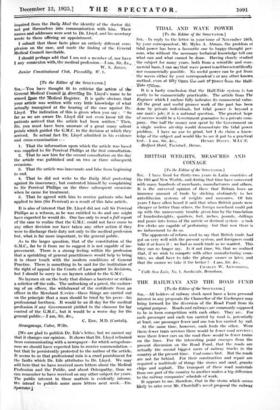[To the Editor of the SPECTATOR.]
Sur,—You have thought fit to criticize the action of the General Medical Council ig clifett-Thg Dr. Lloyd's name to be erased tram lite "Medical Register. It is quite obvious that your article was written with very little knowledge of what actually transpired at the hearing of the case against Dr: Lloyd. The indication of this is given when you say : So far as we are aware Dr. Lloyd did not even know till the patients arrived that the article had been written:' Then, Sir, you must have been unaware of a great many salient points which guided the G.M.C. to the decision at which they arrived. In actual fact Dr. Lloyd admitted in his evidence
and cross-examination :— • 1. That the information upon which the article was based was supplied to Sir Percival Phillips at the first consultation.
2. That he saw him for the second consultation on the day the article was published and on two or three subsequent occasions.
3. That the article was inaccurate and false from beginning to end.
4. -That he did not write to the Daily Mail protesting against its inaccuracy, but contented himself by complaining to Sir Percival Phillips on the three subsequent occasions when he came for treatment.
5. That he agreed with him to receive patients who had applied to him (Sir Percival) as a result of this false article.
It is also of interest that Dr. Lloyd did not call Sir Percival Phillips as a witness, as he was entitled to do and one might have expected he would do. One has only to read a full report of the case to realize that the G.M.C. could not have come to any other decision nor have taken any other action if they were to discharge their duty not only to the medical profession but, what is far more important, to the general public.
As to the larger question, that of the constitution of the G.M.C., far be it from me to suggest it is not capable of im- provement. There is a strong feeling within the profession that a sprinkling of general practitioners would help to bring it in closer touch with the *Modern conditions of General Practice. There. is something to be said for the institution of the right of appeal to the Courts of Law against its decisions, but E should be sorry to see laymen added to the G.M.C: No laymen sit onthe body that disbars a barrister or strikes a solicitor off the rolls. The unfrocking of a priest, the cashier- ing of an officer, the withdrawal of the certificate from an officer in the Merchant S.-rvice—these things are carried out on the principle that a man should be tried by his peers—his professional brethren. It would be an ill day for the medical profession if any Government yielded to the clamour for lay control of the G.M.C., but it would be a worse day for the general public.--1 am, Sir, &c., C. EDE, M.D. (Cantab). Strangeways, Caine, Wilts.
We are glad to publish Dr. Ede's letter, but we cannot say that it changes our opinion. It shows that Dr. Lloyd refrained from communicating with a newspaper—for which scrupulous- ness we should have expected him to receive commendation— but that he persistently protested to the author of the article. It seems to us that professional ruin is a cruel punishment for the faults which Dr. Ede attributes to Dr. Lloyd. We may add here that we have received more letters about the Medical Profession and the Public, and about Osteopathy, than we can remember to have received on any other subject for years. The public interest in these matters is evidently intense. We intend to publish some more litters next week.—Eo.
SP."itc".4






















































 Previous page
Previous page